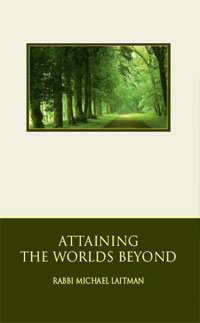The Means of Perceiving the Creator
We must come to the realization that the very feeling of being distanced from the Creator is specifically the means by which we will be able to perceive the Creator. These two senses are known in Kabbalah as kli (vessel) and or (light). The first of these is a desire to experience the Creator, which is gradually born in us while experiencing obstacles (thoughts and desires).
These deliberately distract us from thoughts of the Creator and His Oneness, and make us increase our power of faith by exerting our willpower and thus retaining our thoughts of the Creator.
Light is itself an answer to our desire to receive the perception of the Creator. When the Creator garbs Himself in this desire of a person, the Light enters the vessel, and the order of spiritual growth is such that a person awakens to the desire for the spiritual, to the perception of the Creator, to the need to discover oneself, only under the effect of the Light, to the immense feeling of life, to inspiration derived from becoming closer to spiritual sensations, to the feeling of wholeness.
Experiencing Spiritual Ascents and Descents
But then the individual is invariably visited by extraneous thoughts. Through their influence a descent begins from the level one had achieved back to the level of ordinary desires and thoughts. And then, after a while, one begins to regret these transitory and petty cares and thoughts.
This in turn brings about bitterness and anger on oneself, and sometimes even on the Creator, Who sends that person such thoughts and desires that cause a turning away from the spiritual. It is as a response to this bitter feeling of regret about one’s own spiritual state that one receives the Light from Above, the feeling of coming closer to the One above.
And then arises the willingness to give up everything for that sense of the Creator, for the feelings of security, self- confidence, eternity that one feels when drawing nearer to the eternity and perfection conveyed from the Creator. At that moment, all shame in one’s former thoughts is gone, along with fears of anything in this world.
When one perceives the soul as a part of the Creator and therefore immortal, and agrees with the Creator in everything and justifies everything that the Creator does with His creations, and is ready to deny his own intellect and to follow his Creator, the individual is filled with the Light of the Creator, and becomes a willing servant of the spiritual perceptions.
But once again, after a passage of time, one is visited by an extraneous thought. And so, gradually, after many cycles of disturbing thoughts and spiritual ascents, such a steadfast feeling of spiritual need arises that one finally receives the ever-present Light of the Creator.
The 3 Loves a Person Must Master
Rabbi Baruch once asked his grandfather, the Baal Shem Tov: “It is known that in ancient times, those desiring to experience the Creator were constantly subjecting themselves to restrictions of all sorts, but you have annulled this according to the saying that if anyone voluntarily submits to privations, one transgresses the spiritual laws and must be held responsible. So what then is the most important thing in the work that an individual must do on oneself?”
The Baal Shem Tov answered, “I have come into this world to show the other path; a person must strive to master three things: love of the Creator, love of the people, and love of the spiritual. Then there is no need for voluntary privations.”
The capacity to thank the Creator is already a goodness bestowed by the Creator.
Overcoming Obstacles Sent by the Creator
The benevolence of the Creator is in the fact that we can love Him. His strength is in the fact that we can fear Him.
Why, then, does an individual who strives to approach the Creator and senses that he is coming closer to Him suddenly feel distant?
The Baal Shem Tov answers this as follows: “This is like teaching a toddler to walk; while the toddler is being supported he makes several steps towards the father, but the father, wishing to teach the child to walk independently, moves away until the child learns to walk on its own.”
The Baal Shem Tov said: “An individual’s work on oneself consists of a constant struggle with egoism, a struggle to the very last breath that should result time after time in the replacement of egoism with the Creator.
“The Creator, like a great ruler, sits at the center of His palace. He has erected many walls and obstacles around Himself. He has scattered within the walls of His palace a great wealth and He gives out honors and titles to those who overcome the obstacles. Upon receiving the latter from the Creator, a person becomes content. But only the one who rejects everything, desiring to be with the Creator Himself, earns the right to enter into His Presence.”
Reaching Complete Denial of the “Self”
In nature, there is a transitory state between the seed and the sprout, when the complete decay of the seed, its absolute disappearance, is necessary. Similarly, until we reach the state of complete denial of the “self,” we cannot receive the new spiritual nature.
The Creator has generated the human “self” from “nothing,” and because of this, we must return from the state of the “self” into the state of “nothing” in order to unite with the Creator. This is why it is said that the savior (Messiah) was born the day of the destruction of the Temple.
Therefore, every time we reach the state of complete despair, we realize that all is “dust and vanity of vanities.” Precisely from this state arises a new step in our spiritual ascent, because at this point we can forsake everything.
 “Want To Receive a New Spiritual Nature? Read This.” is based on the book, Attaining the Worlds Beyond by Dr. Michael Laitman.
“Want To Receive a New Spiritual Nature? Read This.” is based on the book, Attaining the Worlds Beyond by Dr. Michael Laitman.

